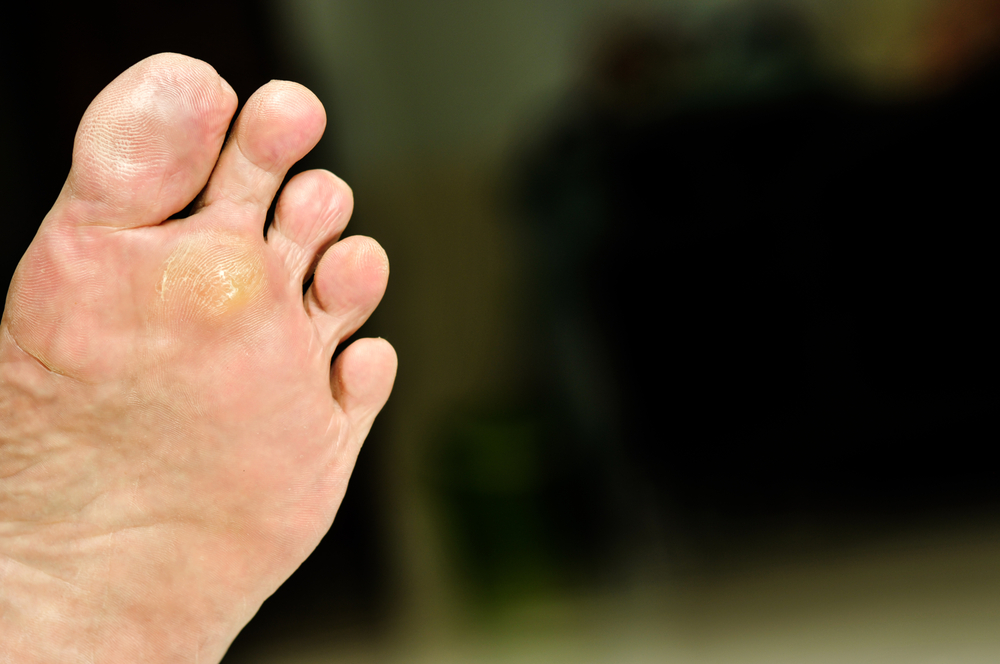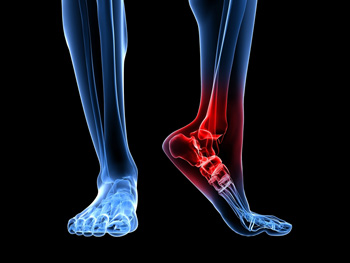July 2020
Preventing Plantar Warts
 Warts on the bottom of the feet, known as plantar warts, are a common condition. About 25% of people get plantar warts at some point in their lifetime, often during childhood or adolescence. Plantar warts are caused by the human papillomavirus, also known as HPV, and can be highly contagious. To prevent plantar warts, avoid walking barefoot in damp public areas, such as community swimming pools or water parks. Wear clean cotton socks and change them regularly. Inspect your feet and take extra precautions if you notice a cut or scratch, as these may make you more susceptible to infection. If you or someone close to you has a plantar wart, it is suggested to keep it covered with a bandage in order to avoid spreading the virus to others. To avoid the risk of contagion or infection, it is recommended that you consult with a podiatrist right away.
Warts on the bottom of the feet, known as plantar warts, are a common condition. About 25% of people get plantar warts at some point in their lifetime, often during childhood or adolescence. Plantar warts are caused by the human papillomavirus, also known as HPV, and can be highly contagious. To prevent plantar warts, avoid walking barefoot in damp public areas, such as community swimming pools or water parks. Wear clean cotton socks and change them regularly. Inspect your feet and take extra precautions if you notice a cut or scratch, as these may make you more susceptible to infection. If you or someone close to you has a plantar wart, it is suggested to keep it covered with a bandage in order to avoid spreading the virus to others. To avoid the risk of contagion or infection, it is recommended that you consult with a podiatrist right away.
Plantar warts can be very uncomfortable. If you need your feet checked, contact one of our podiatrists from Coastal Foot & Ankle Wellness Center, LLC. Our doctors will assist you with all of your foot and ankle needs.
About Plantar Warts
Plantar warts are the result of HPV, or human papillomavirus, getting into open wounds on the feet. They are mostly found on the heels or balls of the feet.
While plantar warts are generally harmless, those experiencing excessive pain or those suffering from diabetes or a compromised immune system require immediate medical care. Plantar warts are easily diagnosed, usually through scraping off a bit of rough skin or by getting a biopsy.
Symptoms
- Lesions on the bottom of your feet, usually rough and grainy
- Hard or thick callused spots
- Wart seeds, which are small clotted blood vessels that look like little black spots
- Pain, discomfort, or tenderness of your feet when walking or standing
Treatment
- Freezing
- Electric tool removal
- Laser Treatment
- Topical Creams (prescription only)
- Over-the-counter medications
To help prevent developing plantar warts, avoid walking barefoot over abrasive surfaces that can cause cuts or wounds for HPV to get into. Avoiding direct contact with other warts, as well as not picking or rubbing existing warts, can help prevent the further spread of plantar warts. However, if you think you have developed plantar warts, speak to your podiatrist. He or she can diagnose the warts on your feet and recommend the appropriate treatment options.
If you have any questions please feel free to contact one of our offices located in St. Augustine, and Palatka, FL . We offer the newest diagnostic and treatment technologies for all your foot and ankle needs.
Arthritis Can Cause Pain in the Feet and Ankles
Causes of Heel Pain
 Heel pain can vary in severity and type. Since the heel is the first part of the foot to make contact with the ground, it absorbs the full force of impact and bears the most weight while walking. One of the most common causes of heel pain is plantar fasciitis. This occurs when the ligament that attaches the heel to the ball of the foot, known as the plantar fascia, becomes irritated. Heel spurs, which are bone growths at the bottom of the heel, can also cause heel pain. Other issues that can cause heel pain include repetitive stress or shock to the heel, standing for too long, or osteoarthritis. If you are experiencing heel pain, it is important to consult with a podiatrist to help diagnose and treat the painful condition.
Heel pain can vary in severity and type. Since the heel is the first part of the foot to make contact with the ground, it absorbs the full force of impact and bears the most weight while walking. One of the most common causes of heel pain is plantar fasciitis. This occurs when the ligament that attaches the heel to the ball of the foot, known as the plantar fascia, becomes irritated. Heel spurs, which are bone growths at the bottom of the heel, can also cause heel pain. Other issues that can cause heel pain include repetitive stress or shock to the heel, standing for too long, or osteoarthritis. If you are experiencing heel pain, it is important to consult with a podiatrist to help diagnose and treat the painful condition.
Many people suffer from bouts of heel pain. For more information, contact one of our podiatrists of Coastal Foot & Ankle Wellness Center, LLC. Our doctors can provide the care you need to keep you pain-free and on your feet.
Causes of Heel Pain
Heel pain is often associated with plantar fasciitis. The plantar fascia is a band of tissues that extends along the bottom of the foot. A rip or tear in this ligament can cause inflammation of the tissue.
Achilles tendonitis is another cause of heel pain. Inflammation of the Achilles tendon will cause pain from fractures and muscle tearing. Lack of flexibility is also another symptom.
Heel spurs are another cause of pain. When the tissues of the plantar fascia undergo a great deal of stress, it can lead to ligament separation from the heel bone, causing heel spurs.
Why Might Heel Pain Occur?
- Wearing ill-fitting shoes
- Wearing non-supportive shoes
- Weight change
- Excessive running
Treatments
Heel pain should be treated as soon as possible for immediate results. Keeping your feet in a stress-free environment will help. If you suffer from Achilles tendonitis or plantar fasciitis, applying ice will reduce the swelling. Stretching before an exercise like running will help the muscles. Using all these tips will help make heel pain a condition of the past.
If you have any questions please contact one of our offices located in St. Augustine, and Palatka, FL . We offer the newest diagnostic and treatment technologies for all your foot and ankle needs.
Possible Causes Of An Achilles Tendon Injury
 It is extremely important to protect the Achilles tendon. It is located in the back of the leg, and connects the calf muscles to the heel bone. It is the thickest tendon in the body, and can easily tear if it becomes injured. This can happen from frequently participating in running and jumping activities, or from unexpectedly stepping off of a curb. An Achilles tendon injury can cause severe pain and discomfort, and can take several weeks to fully recover. Common symptoms of this type of injury can include extreme tenderness, swelling, and it can often be difficult to walk on. As the healing process occurs, it is beneficial to wear shoes that fit correctly, in addition to performing specific stretches. If you have injured your Achilles tendon, it is strongly suggested that you speak with a podiatrist who can determine what the best treatment options are for you.
It is extremely important to protect the Achilles tendon. It is located in the back of the leg, and connects the calf muscles to the heel bone. It is the thickest tendon in the body, and can easily tear if it becomes injured. This can happen from frequently participating in running and jumping activities, or from unexpectedly stepping off of a curb. An Achilles tendon injury can cause severe pain and discomfort, and can take several weeks to fully recover. Common symptoms of this type of injury can include extreme tenderness, swelling, and it can often be difficult to walk on. As the healing process occurs, it is beneficial to wear shoes that fit correctly, in addition to performing specific stretches. If you have injured your Achilles tendon, it is strongly suggested that you speak with a podiatrist who can determine what the best treatment options are for you.
Achilles tendon injuries need immediate attention to avoid future complications. If you have any concerns, contact one of our podiatrists of Coastal Foot & Ankle Wellness Center, LLC. Our doctors can provide the care you need to keep you pain-free and on your feet.
What Is the Achilles Tendon?
The Achilles tendon is a tendon that connects the lower leg muscles and calf to the heel of the foot. It is the strongest tendon in the human body and is essential for making movement possible. Because this tendon is such an integral part of the body, any injuries to it can create immense difficulties and should immediately be presented to a doctor.
What Are the Symptoms of an Achilles Tendon Injury?
There are various types of injuries that can affect the Achilles tendon. The two most common injuries are Achilles tendinitis and ruptures of the tendon.
Achilles Tendinitis Symptoms
- Inflammation
- Dull to severe pain
- Increased blood flow to the tendon
- Thickening of the tendon
Rupture Symptoms
- Extreme pain and swelling in the foot
- Total immobility
Treatment and Prevention
Achilles tendon injuries are diagnosed by a thorough physical evaluation, which can include an MRI. Treatment involves rest, physical therapy, and in some cases, surgery. However, various preventative measures can be taken to avoid these injuries, such as:
- Thorough stretching of the tendon before and after exercise
- Strengthening exercises like calf raises, squats, leg curls, leg extensions, leg raises, lunges, and leg presses
If you have any questions please feel free to contact one of our offices located in St. Augustine, and Palatka, FL . We offer the newest diagnostic tools and technology to treat your foot and ankle needs.








